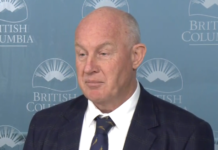BY RATTAN MALL
SURREY Police Service Chief Constable Norm Lipinski told The VOICE on Tuesday that he’s “very optimistic” that he’ll have a lot of constables from other police departments, “certainly the RCMP”, come over to the new municipal police force.
The SPS had earlier on Tuesday announced the appointment of its third deputy chief constable Todd Matsumoto, currently an Inspector with the New Westminster Police Service, and three superintendents: Lavinder (Lav) Mangat, currently serving as the Inspector and officer in charge of the Financial Integrity Program with the Federal Serious and Organized Crime (FSOC) RCMP; Allison Good, currently an Inspector with Ridge Meadows RCMP where she is the officer in charge of Operations; and Michael Procyk, currently an Inspector with the Combined Forces Special Enforcement Unit (CFSEU) of BC where he is serving as the Senior Investigations Officer (RCMP).
Last month, the SPS had announced the appointment of the first two deputy chief constables: Assistant Commissioner Mike LeSage, Chief Officer of the CFSEU-BC; and Superintendent Jennifer Hyland, Officer in Charge of Ridge Meadows RCMP.
Lipinski told this writer: “I posted these positions recently and we got a lot of applications from across Canada. But we’ve got the talent here in B.C. That’s not to say we won’t recruit outside of BC, but if we’ve got the talent here, we’ll recruit from this area. Nonetheless I have had no issue with picking people so far. We get phone calls here every day: ‘When are you going to post constables? When are you going to post constables?’”
But first the SPS had to build its executive team. Nest comes the recruiting unit and the putting in place of a recruiting process. And Lipinski foresees no problem with that.
“We’re going to be offering very competitive wages – very competitive. And for sure they will be much higher than the RCMP. We will be offering some of the best equipment. We will be offering some of the best training. We will be offering some of the best leadership development and we will be offering many other benefits that have yet to be worked out,” he said.
“So, when that goes out and people see, we will become, in my view, a place where people have a look and hopefully join,” he added.
ADVERTISING AND HIRING
I asked Lipinski when the process for advertising for constables and then for hiring them is likely to start.
He noted that standing up a police department is very complicated. He said: “We are going to hire people first and they are going to look at something called terms and conditions of employment. And then when we hire those people, they form a union and then we have a collective agreement and we move on from there.”
The SPS is looking to hire late spring or early summer, if everything goes according to plan. Lipinski added: “What I mean by that is that before I put boots on the ground, which I would like to do sometime this year, … a lot of legal stuff has to be accomplished … and there’s three levels of government involved – the municipal, the provincial and the federal governments.”
He said: “We are going to look to have it done and move forward as quickly as possible. And I am optimistic that it will go according to plan, but I’ve been a police officer for many years, this has never been done and it’s almost every week you find out something – ‘oh, I didn’t realize that has to be done! I didn’t realize this had to be done1’ I think we have very good working relationships with a number of different stakeholders and I think we are moving ahead. We have momentum now, we have very good momentum, but it’s complicated.”
Lipinski said he wanted two things to happen: “I want this transition to be as seamless as possible. So that requires a lot of planning. Number two, I do not want and I will not have any public safety compromises. We cannot compromise public safety and I want that to be very clear to the community. Public safety will not be compromised. … As you can appreciate it takes a bit of time, there’s a lot of people involved and lots of issues.”
RESISTANCE TO CHANGE
I asked Lipinski how he is dealing with the kind of opposition some have demonstrated, and he coolly pointed out: “Anytime there is change, and certainly when there’s significant change, in any company, in any public service, in any government, of course there’s people that resist that, and some strongly, and try and get their point of view across. I understand that. I get it.”
He added: “There’s some strong emotions. I understand the allegiance to the RCMP. But I do say this that we’re here to stay and I go with the facts. And here’s the facts. Dr. Bonnie Henry says that in her experience ‘municipal police officers are more aligned with the community and the community norms and ideas and issues.’ … That is the Provincial Health Officer and I think we all agree [she is] extremely respected. … I understand that some people do not want us to go down this road and they can put their view out there. I only ask that the community looks at the facts and make their own determination based on those facts.”
I pointed out to Lipinski that there is the fear that costs are going to be monumental and taxpayers will have to face the burden.
He noted: “First of all, we know there’s a police board that constitutes the police service. The police board is responsible for the budget and they give it to [City] Council and then the Council either approves or disapproves. I can tell you for this year with the monies that was given I have no problem with the budget.”
He added: “Now, it’s a start-up; obviously it will cost some additional expense because we are starting from the ground up. It’s certainly understandable but keep in mind that the RCMP with their union will be collective bargaining with the federal government for increased wages. So obviously the objective is for them to have competitive wages with the municipal police officers. So presumably that will translate down to a huge jump in costs for the Surrey residents. My information is that they are collective bargaining for a high amount because there has not been a pay increase for years and they need to catch up. So that will be transmitted down.”
RCMP’S ‘BROKEN DREAMS, BROKEN LIVES’
Lipinski also pointed out some harsh realities about the RCMP: “Keep in mind that there was a report in the fall called Broken Dreams, Broken Lives … it was by former Supreme Court justice Michel Bastarache looking at harassment in the RCMP. He did another review because of all the class action suits against the RCMP. He concluded that since, I believe, 2008, there have been about 12 reviews of the RCMP and he concluded that still there hasn’t been significant change and his language was along the lines of that nothing has moved forward (in the RCMP). Things have not moved forward, so many reviews and it’s still not there. So the Surrey citizens have to look at that again. That’s a fact, that’s a report that’s online, anybody can read it.”

Lipinski said: “It will, in my view, presumably cost the Surrey residents a lot more for the RCMP and that’s just a fact, and then you have to look at what you have and are you comfortable with that kind of an organization.”
He said: “Let me be clear: this is not about the people; this is about the bureaucracy, this is about how it operates from Ottawa and how slow it moves, how it’s not responsive to the community as quick as a municipal force – but not the people, because I worked there and some of the finest police officers that I have ever worked with has been in the RCMP.
“So, it is just the bureaucracy. You have to lean on Ottawa. And a really easy example of that is policy. So, the Surrey Police Service Board will review a policy package that I put together. They can change it based on the community needs.
“The policy for the RCMP is controlled out of Ottawa and the same policy applies to all RCMP people across the country. So, it’s a little bit harder for Surrey as a community to change that policy and have a voice.
“So, this is all the goodness of having your own municipal department. I think the accountability to the community is closer because of a police board. When you have a municipal police department, I think that the constables as they start their career, 90 per cent of them will stay for 25 years plus, maybe even higher. Why? Because in the municipal world you stay in that location typically for a whole bunch of reasons: family, you want to live here, pension issues, you like the work, you like the organization.”
Lipinski added: “So, when you have that kind of community connection for that length of time with 800 people [of the police service], that says a lot for listening to the community and problem solving, crime reduction, wellness in the community – and I am talking about the vulnerable population – working with stakeholders for 25 years, the same people, there’s a lot to be said about that.”
COMMUNITY CONSULTATION
Lipinski told The VOICE that sometime in spring or probably summer, he wants to put together a community engagement plan.
He added: “This is important to me. When I say community, I mean the entire spectrum – faith community, citizens’ community, business community, political community, all these entities and I’ve got about nine different categories that I want to reach out to and see what they have to say about what kind of police service they would like in Surrey. Once I get the results back, what we’ll do with the Surrey Police Service and the Surrey Police Board is sit down and build up a strategic plan based on the community input. And then right after that, based on that, that’s when you have boots on the ground and they are implementing the strategic plan that was based on community input. That’s where I am going with all this. So, it’s community consultation first, strategic plan, boots on the ground. That is how the sequence will go.”
With the pandemic, community engagement provides a challenge, but there will be surveys, virtual town halls and perhaps even some socially distanced one-to-ones with community leaders in a large room.
The SPS will also be looking at the crime patterns and the calls – “because we know that upwards of 80 per cent of policing calls are not crime-related; they’re more people-problem related,” said Lipinski.
“So where are the people problems? I am interested in the issue of the vulnerable sector – what is the statistics with that? The overdoses, the drug trafficking, the homeless. When we have that kind of data and we go to the community and say this is what we’ve got, what do you feel we should do, and we take their input and then we put a plan together and implement it with Surrey Police officers, I think the citizens will be pleased with that.”
Lipinski noted: “And, yes, it’s complicated. Have a little patience; it’ll take some time. We are moving as quickly as possible. … I think it’s very, very positive where we are going with this and I think there’s a bright future for Surrey citizens.”
READ ALSO:













Comments are closed.